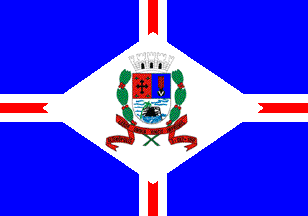 image by Ivan Sache,
3 March 2013
image by Ivan Sache,
3 March 2013
Last modified: 2013-05-18 by ian macdonald
Keywords: sao paulo | altinópolis |
Links: FOTW homepage |
search |
disclaimer and copyright |
write us |
mirrors
 image by Ivan Sache,
3 March 2013
image by Ivan Sache,
3 March 2013
Altinópolis was established at the end of the 19th century by Antonio Garcia de Figueiredo and his wife Maria Tereza, owners of the Fortaleza Estate. She was the daughter of José Garcia da Cruz, who had settled the region with his father, Captain Diogo Garcia da Cruz, and his brothers Joaquim and João. The first settlement, founded in 1866, was named Arraial de Nossa Senhora da Piedade. The parish of Nossa Senhora da Piedade de Mato Grosso de Batatais was established by Provincial Law No. 5 of 8 March 1875 The municipality of Altinópolis was established by State Law No. 1,610 of 3 December 1918 and inaugurated on 9 March 1919. The municipality is named for Altino Arantes (1876-1965), the 10th President of the São Paulo State (1916-1920).
Altinópolis was the "workshop" of the Italian-born sculptor Bassano
Vaccarini (1914-2002), who lived in the town from 1980 to his death.
Vaccarini aimed at transforming Altinópolis in an "outdoors gallery".
His "Sculpture Garden" was inaugurated in 1992.
http://altinopolis.sp.gov.br - Municipal website
The flag of Altinópolis was officially adopted in 1919 [?], the year of the municipal emancipation of the town.
The flag is blue with a white-red-white cross. In the middle of the
flag is placed a white lozenge charged with the municipal coat of arms.
Blue, white and red represent the sky, peace and ripe coffee berries,
respectively; coffee was once the main crop in the municipality.
The cross is a symbol of the Christian faith.
http://altinopolis.sp.gov.br/?page_id=99 - Municipal website
Photos of the flag
http://altinopolis.sp.gov.br/?p=2773
http://altinopolis.sp.gov.br/?p=3407
http://camaradealtinopolis.sp.gov.br/fotos
The coat of arms of Altinópolis is made of a classical Portuguese
shield surmounted by a mural crown standing for a municipality.
The dexter quarter shows a cross ("cruz"), recalling Captain Diogo
Garcia da Cruz, one of the first colonizers of the place, cantonned by
four leaves of fig tree ("figueira"), recalling Garcia's four sons,
Joaquim, Antonio, José and João Garcia de Figueiredo.
The sinister quarter shows the medal granted by the Imperial
Government in 1867 to symbolize and perpetuate the glorious acts of
the local forces, which defended the national territory in the regions
of Laguna and Dourados, Goiás State.
The lower quarter depicts the Itambé Cave, with, at its entrance, a
palm tree bowed by the wind.
The shield is supported by two branches of coffee.
The red scroll placed beneath the shield is inscribed with the
municipality's motto "LABOR OMNIA VINCITE IMPROBUS" (Labour Always
Triumphs Over Obstacles). The date "3 DEZ 1918" ("DEZ" for "dezembro",
"December") recalls the municipal emancipation.
http://altinopolis.sp.gov.br/?page_id=108 - Municipal website